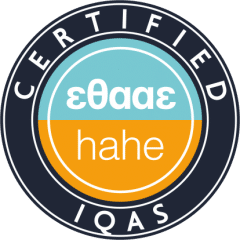Course Tutors
Course Outline
Scholarly Communication is defined as the system through which the creation, evaluation, dissemination and preservation of the research community outputs and accomplishments of any form (e.g. journal articles, monographs, web material, deliverables, patents etc.) are realized. The Scholarly Communication course has the following objectives:
- Understanding: The complete scientific publication cycle, including the scientific method, the evaluation of the research outcomes and their publication through formal channels such as scientific journals, the level of impact, the means for dissemination, the intellectual property rights, as well as the tools for long-term preservation and reuse.
- Analysis: Students will be able to identify, study and analyze the Scholarly Communication major challenges such as research method and output types, scientific publication procedures, peer-review models, traditional and alternative impact indicators, ethics rules and bias cases, the intellectual property rights, new dissemination methods, the application of FAIR principles in research data (Findability, Accessibility, Interoperability and Reusability), the Open Science movement concepts and the data preservation
- Composition: By attending the Scholarly Communication course, students will be able to counsel researchers on how to be more productive while publishing their research results per scientific discipline. Also, they will be in a position to participate effectively as professionals with any role in the scientific publication cycle.
- Evaluation: Students will be provided with the ability to evaluate different publication channels and formats, peer-review models, bibliometric indicators and alternative metrics for impact measurement, licensing models, dissemination tools etc. Also, they will have the chance to develop critical thinking skills to specific challenges that Scholarly Communication faces today, such as Open Access, Open Data and Open Science movements, the Business of Scholarship Paywall, the Science with and for society concept
The course is divided into the following sections:
- Section 1. Understanding the research cycle (scientific method, scientific proposal structure, basic – applied – evaluative research, multidisciplinary- interdisciplinary research etc.)
- Section 2. Understand the Publication cycle (publications categories and formats, scientific publication landscape, peer-review cycle and models, publication bias, serial crisis, the Open Journal System, )
- Section 3. Traditional and modern metrics for research output impact assessment (citation databases, h-index, m-index, impact factor, altmetrics )
- Section 4. Scholarly Communication special topics (Intellectual Property Rights – IPRs, Publication agreements, Open Access – Open Data – Open Science, the FAIR principles, modern dissemination channels, Research Data Management Plan, ethics in Research, the Business of Scholarship Paywall, the Science with and for society concept, European Open Science Cloud ).



